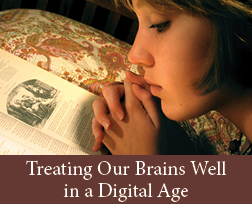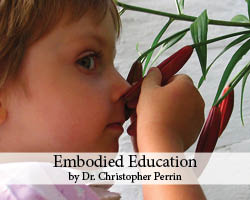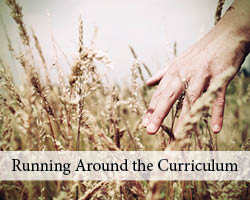
Treating Your Brain Well in a Digital Age
Our brains are responsive, adaptable organs—more adaptable than we ever imagined. Our brains serve us like faithful dogs that want very much to please. If we read lots of great books and novels on paper, our brains become optimized for this behavior. If we spend seven hours per day before a computer screen and swiping our iPhones, our brains will optimize for this. What do you want your brain to do for you?
May Swenson crafted a beautiful poem, entitled “Question,” about the body , in which she calls her body “my horse, my hound,” and “my good, bright dog.” In the context of this essay, I think of my brain, too, as my horse and hound. Here is Swenson’s short poem:
“Question”
by May SwensonBody my house
my horse my hound
what will I do
when you are fallenWhere will I sleep
How will I ride
What will I huntWhere can I go
without my mount
all eager and quick
How will I know
in thicket ahead
is danger or treasure
when Body my good
bright dog is deadHow will it be
to lie in the sky
without roof or door
and wind for an eyeWith cloud for shift
How will I hide?
Our brain is a critical part of our body—it might rightly be considered our horse, our mount, or our good, bright dog. Surely we should treat it well.
The scientific evidence is in, though I doubt most of us needed it to be convinced. If you spend several hours looking at a screen every day, you have become your own evidence.
You are not reading very much. You have not read a novel in a year. You don’t subscribe to paper magazines or journals; you read mostly online. You are not having sustained conversations about an important idea. When your phone is missing, you panic. As you retire to sleep, your last gesture is to check e-mail on your phone. You greet the new day in the morning by doing the same thing. You no longer think it unusual when others consult their phones during meals, popping in and out of the table conversation. In fact, you are beginning to do the same.
When the research tells us that our adult brains will adapt and “rewire” neural pathways to optimize a life of discursive screen surfing, we may raise an eyebrow, but must of us recognize that in some way we have indeed changed. Our eyebrows raise only because we thought it was simply a change in our habits and behavior—we didn’t know that our brains had changed.
“Reading long, literary sentences sans links and distractions is actually a serious skill that you lose if you don’t use it. Before the Internet, the brain read in a linear fashion, taking advantage of sensory details to remember where key information was in the book by layout.” –Rachel Grate, “Science Has Great News for People Who Read Actual Books, Mic.com, September 22, 2014
But they have. You changed your brain by surfing the Internet for five hours a day and wearing out the buttons on your smartphone. Now your brain has adapted for a life before a glowing screen. You will do better now in this new sleek and glassy life. But you will not read and think as you used to. Go ahead and try to read a book again. It will be hard. Your brain adapted to the screen. Why do you now want to read a printed novel?
“It’s like your eyes are passing over the words but you’re not taking in what they say,” she confessed. “When I realize what’s happening, I have to go back and read again and again.” –Claire Handscombe, as quoted in the Washington Post article “Serious Reading Takes a Hit from Online Scanning and Skimming, Researchers Say” by Michael S. Rosenwald, April 6, 2014
By the way, you are also moodier than you once were, and more irritable. You are easily distracted, and in fact now generally want distraction. The thought of reading a short story or some poetry does still flutter through your mind, but it is always overcome by an unconscious movement of your hand for your phone and a swipe to check Facebook, e-mail, or the news. The fact is, you have a muscle–memory relationship with your phone. You find yourself stroking the glass of your phone throughout the day with no particular purpose in mind. You touch your phone the way you sweep back your hair, rub your eyes, or scratch an itch. To the people around, you are usually not “fully present,” but for the most part neither are they—and they certainly don’t seem to mind or care.
The irony is that you say you want to be an educated human being and seek to live the good life. You even research these matters online (and your phone is one of the primary channels of information about the good life). But you find it harder and harder to read anything like the dialogues of Plato or Dante and to have conversations with others about those things of which a good life consists. And now you hear that your brain is not the strong and helpful ally it once was. Yes, you have changed, and (no surprise) your brain has changed with you. You whistle for it like a shepherd for his sheepdog, but your brain does not leap before you, ready to run, gather, and herd. No, your brain is more like a house dog, domesticated by the screen. If it is going to run and work for you again—well, it will need to be retrained.
That is the good news in this otherwise sad narrative: Your brain is capable of retraining. It still is your faithful friend, eager to please, and will gladly follow you outside if you drop your phone and go for a brisk walk. The two of you may have to walk together before you run.
“A 2014 study found that readers of a short mystery story on a Kindle were significantly worse at remembering the order of events than those who read the same story in paperback.” –Rachel Grate
I grew up with an Old English Sheepdog named J. Edgar, our family’s good, bright dog. J. Edgar lived to be thirteen, growing old and hobbling about before he eventually died (a sad day indeed for our family). He never forgot how to herd and gather. Though he was a house dog, I am convinced that in his youth he could have been taken to a sheep farm and performed nobly after a season of training and discipline. They say you can’t teach an old dog new tricks. But an old dog can still do his old tricks, even if with less agility. Our brains are not old dogs. While they age, they remain remarkably adaptable and renewable. What is more—the more we read, the longer they remain young.
This, then, is the neurological gospel: Though you have wandered, you may come home to a welcome. Your brain will happily follow you back to the books, conversation, and contemplation. Like a house dog returning to the field, it will take a while to get in shape, a matter of weeks not days, or perhaps even a few months. For some of us, it may take a solid year, but we will find ourselves regaining strength week by week, month by month.
So here is to our brain—our remarkable horse and hound that helps us ride and hunt. Let us give it a happy home, nurtured, rested, fed, and exercised.
Some Resources for Further Reading:
- “Science Proves Reading to Kids Really Does Change Their Brains,” by Catherine Pearson (http://www.huffingtonpost.com/entry/science-proves-reading-to-kids-changes-their-brains_us_55c26bf4e4b0f1cbf1e38740)
- “Pediatricians often recommend parents routinely read aloud to their young children. Now, for the first time, researchers have hard evidence that doing so activates the parts of preschoolers’ brains that help with mental imagery and understanding narrative—both of which are key for the development of language and literacy.”
- “Science Has Great News for People Who Read Actual Books” by Rachel Grate (http://mic.com/articles/99408/science-has-great-news-for-people-who-read-actual-books#.GqF5jm5PJ)
- “Slow-reading advocates recommend at least 30 to 45 minutes of daily reading away from the distractions of modern technology. By doing so, the brain can reengage with linear reading. The benefits of making slow readinga regular habit are numerous, reducing stress and improving your ability to concentrate.” —Rachel Grate
- “Serious Reading Takes a Hit from Online Scanning and Skimming, Researchers Say, by Michael S. Rosenwald (https://www.washingtonpost.com/local/serious-reading-takes-a-hit-from-online-scanning-and-skimming-researchers-say/2014/04/06/088028d2-b5d2-11e3-b899-20667de76985_story.html)
- “To cognitive neuroscientists, Handscombe’s experience is the subject of great fascination and growing alarm. Humans, they warn, seem to be developing digital brains with new circuits for skimming through the torrent of information online. This alternative way of reading is competing with traditional deep reading circuitry developed over several millennia.” —Michael S. Rosenwald
- “This is Your Brain on Jane Austen, and Stanford Researchers Are Taking Notes,” by Corrie Goldman (http://news.stanford.edu/news/2012/september/austen-reading-fmri-090712)
- “Surprising preliminary results reveal a dramatic and unexpected increase in blood flow to regions of the brain beyond those responsible for ‘executive function,’ areas which would normally be associated with paying close attention to a task, such as reading, said Natalie Phillips, the literary scholar leading the project.” —Corrie Goldman
- “Reading on a Screen Before Bed Might Be Killing You,” by Damon Beres (http://www.huffingtonpost.com/2014/12/23/reading-before-bed_n_6372828.html)
- “Reading from an iPad before bed not only makes it harder to fall asleep, but also impacts how sleepy and alert you are the next day, according to new research from Brigham and Women’s Hospital in Boston, Massachusetts. The study, published in the journal Proceedings of the National Academy of Sciences on Monday, said the findings could impact anyone who uses an eReader, laptop, smartphone, or certain TVs before bed.” —Damon Beres
- “Screentime Is Making Kids Moody, Crazy and Lazy,” by Victoria L. Dunckley, M.D. (https://www.psychologytoday.com/blog/mental-wealth/201508/screentime-is-making-kids-moody-crazy-and-lazy)
- “Both parents and clinicians may be ‘barking up the wrong tree.’ That is, they’re trying to treat what looks like a textbook case of mental disorder, but failing to rule out and address the most common environmental cause of such symptoms—everyday use of electronics. Time and again, I’ve realized that regardless of whether there exists any ‘true’ underlying diagnoses, successfully treating a child with mood dysregulation today requires methodically eliminating all electronics use for several weeks—an ‘electronics fast’—to allow the nervous system to ‘reset.’”











